TimTaiLieu.vn - Tài liệu, ebook, giáo trình, đồ án, luận văn
Tổng hợp tất cả tài liệu, ebook, giáo trình Khối Ngành Kinh Tế chọn lọc và hay nhất.

 Bài giảng Personal Financial - Chapter 5A Consumer Credit #1
Bài giảng Personal Financial - Chapter 5A Consumer Credit #1Objective 1 Analyze Advantages and Disadvantages of Using Consumer Credit Credit Based on trust in people’s ability and willingness to pay bills when due Consumer Credit Use of credit by individuals for personal needs, except a home mortgage Dates back to colonial times; exploded after invention of cars (installment loans; traveling) A majo...
 24 trang | Chia sẻ: nguyenlinh90 | Ngày: 20/07/2019 | Lượt xem: 1022 | Lượt tải: 0
24 trang | Chia sẻ: nguyenlinh90 | Ngày: 20/07/2019 | Lượt xem: 1022 | Lượt tải: 0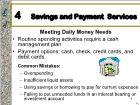 Bài giảng Personal Financial - Chapter 4: Savings and Payment Services
Bài giảng Personal Financial - Chapter 4: Savings and Payment ServicesMeeting Daily Money Needs Routine spending activities require a cash management plan Payment options: cash, check, credit cards, and debit cards Common Mistakes: Overspending Insufficient liquid assets Using savings or borrowing to pay for current expenses Failing to put unneeded funds in an interest bearing or investment account
 24 trang | Chia sẻ: nguyenlinh90 | Ngày: 20/07/2019 | Lượt xem: 968 | Lượt tải: 0
24 trang | Chia sẻ: nguyenlinh90 | Ngày: 20/07/2019 | Lượt xem: 968 | Lượt tải: 0 Bài giảng Personal Financial - Chapter 3: Taxes in Your Financial Plan
Bài giảng Personal Financial - Chapter 3: Taxes in Your Financial PlanStart planning for taxes . Know current tax laws as they affect you Maintain complete and appropriate tax records Make purchase and investment decisions that reduce tax liability Goal: Paying your fair share but still taking advantage of available tax benefits
 24 trang | Chia sẻ: nguyenlinh90 | Ngày: 20/07/2019 | Lượt xem: 952 | Lượt tải: 0
24 trang | Chia sẻ: nguyenlinh90 | Ngày: 20/07/2019 | Lượt xem: 952 | Lượt tải: 0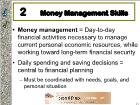 Bài giảng Personal Financial - Chapter 2: Money Management Skills
Bài giảng Personal Financial - Chapter 2: Money Management SkillsMoney management = Day-to-day financial activities necessary to manage current personal economic resources, while working toward long-term financial security Daily spending and saving decisions = central to financial planning Must be coordinated with needs, goals, and personal situation
 24 trang | Chia sẻ: nguyenlinh90 | Ngày: 20/07/2019 | Lượt xem: 1159 | Lượt tải: 0
24 trang | Chia sẻ: nguyenlinh90 | Ngày: 20/07/2019 | Lượt xem: 1159 | Lượt tải: 0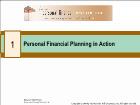 Bài giảng Personal Financial - Chapter 1: Personal Financial Planning in Action
Bài giảng Personal Financial - Chapter 1: Personal Financial Planning in ActionObjective 1: Identify Social and Economic Influences on Personal Financial Goals Financial Planning: process of managing your money to achieve personal economic satisfaction. Financial Plan: formalized report that summarizes your current financial situation, analyzes your financial needs, and recommends future financial activities.
 22 trang | Chia sẻ: nguyenlinh90 | Ngày: 20/07/2019 | Lượt xem: 932 | Lượt tải: 0
22 trang | Chia sẻ: nguyenlinh90 | Ngày: 20/07/2019 | Lượt xem: 932 | Lượt tải: 0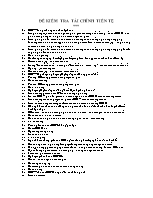 Đề kiểm tra tài chính tiền tệ
Đề kiểm tra tài chính tiền tệ1. NHTW là ngân hàng của chính phủ vì a. Là ngân hàng thuộc sỡ hữu của chính phủ,phát hành trái phiếu để tăng vốn cho NHTM, bảo quản dự trữ quốc gia về ngoại hối,các chứng từ có giá. b. Là cơ quan quản lí về mặt nhà nước các hoạt động của hệ thống ngân hàng bằng pháp luật,thay mặt nhà nước trong quan hệ nước ngoài trên lĩnh vực tiền tệ,tín dụng v...
 5 trang | Chia sẻ: nguyenlinh90 | Ngày: 20/07/2019 | Lượt xem: 1131 | Lượt tải: 0
5 trang | Chia sẻ: nguyenlinh90 | Ngày: 20/07/2019 | Lượt xem: 1131 | Lượt tải: 0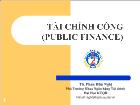 Bài giảng Tài chính công (Public Finance)
Bài giảng Tài chính công (Public Finance)Bài 1: Tổng quan chung về Tài chính công Tài chính công là gì? Vai trò chính phủ và chi tiêu công Cơ sở cho hoạt động của chính phủ Phân tích khuôn khổ chi tiêu công Bài 2: Hệ thống ngân sách nhà nước Nội dung thu chi Phân cấp quản lý Quy trình NSNN Cân đối ngân sách Bài 3: Hệ thống thuế nhà nước Khái quát chung hệ thống thuế Quản lý cá...
 191 trang | Chia sẻ: nguyenlinh90 | Ngày: 20/07/2019 | Lượt xem: 1557 | Lượt tải: 1
191 trang | Chia sẻ: nguyenlinh90 | Ngày: 20/07/2019 | Lượt xem: 1557 | Lượt tải: 1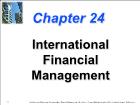 Bài giảng Financial Management - Chapter 24: International Financial Management
Bài giảng Financial Management - Chapter 24: International Financial ManagementAfter Studying Chapter 24, you should be able to: Explain why many firms invest in foreign operations. Explain why foreign investment is different from domestic investment. Describe how capital budgeting, in an international environment, is similar to or dissimilar from that in a domestic environment. Understand the types of exchange-rate exp...
 45 trang | Chia sẻ: nguyenlinh90 | Ngày: 20/07/2019 | Lượt xem: 1238 | Lượt tải: 0
45 trang | Chia sẻ: nguyenlinh90 | Ngày: 20/07/2019 | Lượt xem: 1238 | Lượt tải: 0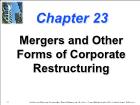 Bài giảng Financial Management - Chapter 23: Mergers and Other Forms of Corporate Restructuring
Bài giảng Financial Management - Chapter 23: Mergers and Other Forms of Corporate RestructuringAfter Studying Chapter 23, you should be able to: Explain why a company might decide to engage in corporate restructuring. Understand and calculate the impact on earnings and on market value of companies involved in mergers. Describe what benefits, if any, accrue to acquiring company shareholders and to selling company shareholders. Analyze ...
 48 trang | Chia sẻ: nguyenlinh90 | Ngày: 20/07/2019 | Lượt xem: 1138 | Lượt tải: 0
48 trang | Chia sẻ: nguyenlinh90 | Ngày: 20/07/2019 | Lượt xem: 1138 | Lượt tải: 0 Bài giảng Financial Management - Chapter 22: Convertibles, Exchangeables, and Warrants
Bài giảng Financial Management - Chapter 22: Convertibles, Exchangeables, and WarrantsAfter Studying Chapter 22, you should be able to: Describe the features of three common types of options that may be used by firms in their financing– the convertible security, the exchangeable bond, and the warrant. Understand why these securities with option features may be attractive for a firm's long-term financing needs. Explain the diffe...
 29 trang | Chia sẻ: nguyenlinh90 | Ngày: 20/07/2019 | Lượt xem: 999 | Lượt tải: 0
29 trang | Chia sẻ: nguyenlinh90 | Ngày: 20/07/2019 | Lượt xem: 999 | Lượt tải: 0
Website đang trong thời gian thử nghiệm, chờ xin giấy phép của Bộ TT & TT.

